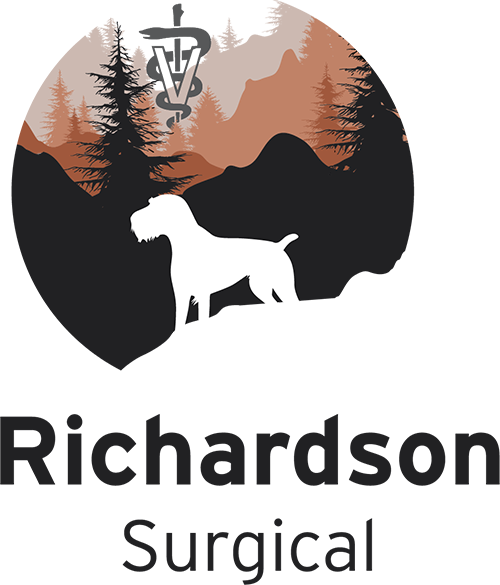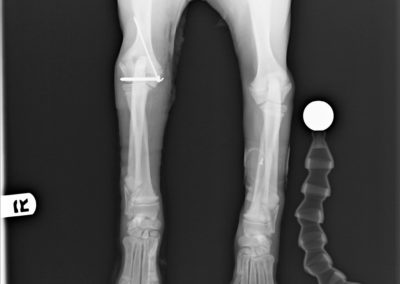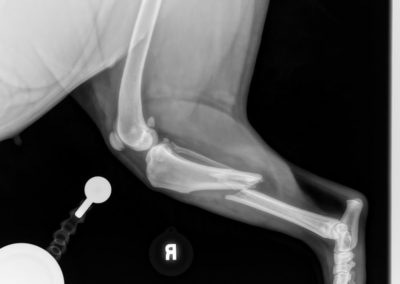
Surgical Services
We provide high-quality veterinary surgery at an affordable price. Richardson Surgical offers a variety of orthopedic procedures in the Treasure Valley and beyond. We offer an alternative to referral surgery by coming to your regular veterinary clinic or hospital to perform high-quality veterinary surgery.
Veterinary Services in the Greater Boise Valley and Beyond.
Richardson Surgical is a mobile vet who offers a wide range of surgical services. Learn more about all the services we provide below.

Tibial Plateau Leveling Osteotomy (TPLO)
The surgery that is commonly offered is called a TPLO, which stands for Tibial Plateau Leveling Osteotomy. This is a procedure that essentially changes the physics of the leg, making the ligament unneeded for stability of the knee. The surgeon makes cuts to the bone, rotates it, and then uses screws and a plate to provide stability. While there are a few other procedures, the TPLO remains the standard of care for this injury.

Extracapsular Repair
The cranial cruciate ligament (CCL), also called the ACL in humans, is a very important ligament in the canine knee. The CCL protects against 3 main forces: internal rotation, hyperextension, and cranial tibial thrust. Injuries to the CCL in dogs can be a result of trauma and degeneration. Most CCL ruptures in the dog are a result of degeneration. This supports the fact that 30-40% of dogs that rupture one CCL will eventually rupture the CCL in the opposite knee.

Fracture Repair OPTIONS
Some repair methods we use include:
- Plating and screws
- Pins and wires
- Lag screw fixation

Femoral Head Osteotomy
An FHO is a surgical procedure that removes a diseased or damaged hip, by removing the portion of the femur that normally forms the “hip joint” (the head and the neck of the femur). Over time, this creates a “false joint,” as scar tissue develops.

Hip luxation (Utilizing toggle technique)
Hip luxation occurs when the head of the femur becomes displaced from the acetabular socket. This type of displacement is commonly caused by trauma. However, joint deterioration or hip dysplasia can also contribute.
Don’t see what you were looking for? Just ask!
Here at Richardson Surgical, we prioritize your pet’s well-being. Nothing is more important than getting the treatment your pet needs, and if there is a service that we cannot provide, we will refer you to a trusted specialist to get your pet the care that they deserve. Feel free to give us a call with any questions you may have. We also have some frequently asked questions below!
Why should we consider using your orthopedic surgery services?
- I was fortunate to have good mentors early on in my career with regard to surgery and specifically orthopedic surgery. Likewise, I also have been doing orthopedic surgery since I started practice in 2009.
- I have clinical experience and completed CE with multiple methods for the cranial cruciate deficient stifle.
- TPLO
- TTA
- Extracapsular Repair
- Multiple methods for fracture repair
- Locking and Non-locking bone plating
- External Skeletal Fixation
- Plate-Rod combination
- IM pin and cerclage wiring
- Lag screw and tension band wire repairs
- Other various orthopedic surgeries
- Hip toggle for coxofemoral luxation
- Patella luxation
- FHO
- Admittedly, there are some procedures I don’t have experience with and cases that inevitably I advise referral to specialists for.
What do we, as the rDVM or host clinic provide?
- The host clinic provides the anesthesia and nurse to run the anesthesia, operating room, radiography. Occasionally a surgical assistant is needed to help with retraction or reduction for part of the procedure.
- Your clinic materials for medications, suture, bandage material, fluid therapy, injectables, etc. are used for the case.
- Payment collection and medical record-keeping are through the host clinic. I generate surgical records for your record-keeping software and provide go-home instructions for the owners.
Who determines pricing?
- The final price is set by you, the host clinic. The invoice would have a single line item for my services. The rest of the charges for all the other ancillary items and services belong to the host clinic (anesthesia, radiographs, medications, fluids, staff time, bandage material, hospitalization, etc.)
- I can offer suggestions for the final client price if you wish.
If we (the host clinic) use your services, what do you as the surgeon provide for the procedure?
- I will provide all the orthopedic equipment and hardware/plates/screws to perform the procedure.
- I bring my own sterile drape kits that are custom-made for orthopedic procedures, and I have a small electrocautery unit that I travel with.
Who is responsible for follow-up with the client?
- I provide my personal number to the clients and stay in contact with them after the procedure, usually once per week or as needed to answer questions. My goal is to make myself available to owners and take the burden off the rDVM. Certainly, if you wish to communicate regularly with owners, I have no objection.
- Recheck radiographs and any ‘physical’ follow-up is done at your facility by your staff at the client’s expense.
- Complications (such as suture line dehiscence due to licking) have proved rare overall. In this example, culture and sensitivity are done through your facility at the client’s expense.
- I have found occasionally there is a fear from host clinics that a mobile surgeon may ‘come in the side door,’ not meet with clients, cut the case and leave, never to interact with the client at all. That is NOT how I operate or conduct my services. I enjoy partnering with my colleagues on managing surgical cases.













